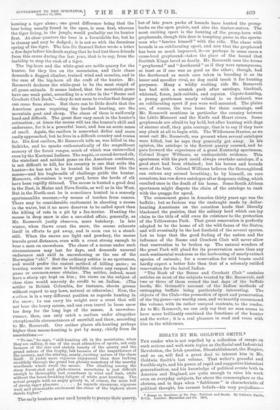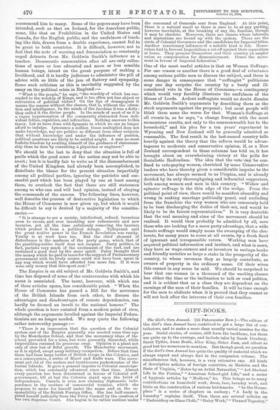ESSAYS BY MR. GOLDWIN SMITH.* THE reader who is not
repelled by a collection of essays on such serious and well-worn topics as the Social and Industrial Revolution, the Irish question, Disestablishment, the Empire, and so on, will find a great deal to interest him in Mr. Goldwin Smith's last volume. That writer's graceful and forcible style, and his power of rapid and suggestive historical generalisation, and his knowledge of political events both in America and England, are quite enough to raise his work even on everyday subjects, far above the commonplace or the obvious, and in days when " flabbiness " is characteristic of political thought, his earnest beliefs—his very prejudices- • Rosalie on Questions of tho Day : Political and Social. By Ctoldwin Smith, D,O,L, London : Macmillan and Co. 1898. recommend him to many. Some of the papers may have been intended, such as that on Ireland, for the American public, some, like that on Prohibition in the United States and Canada, for the English public, and the usefulness of teach- ing like this, drawn from a double experience, cannot fail to he great to both countries. It is difficult, however, not to feel that the note of warning and denunciation so constantly urged detracts from Mr. Goldwin Smith's influence as a teacher. Democratic communities after all are only collec- tions of more or less educated and more or less sensible human beings, intent on the great purpose of making a livelihood, and it is hardly judicious to administer the pill of advice with so little of the jam of flattery and sympathy. Some such criticism as this is inevitably suggested by the essay on the political crisis in England :— " What is the people," he says, "the worship of which has suc- ceeded to the worship of Kings, and is too often not less abject or subversive of political virtue ? On the lips of demagogues it means the masses without the classes, that is, without the educa- tion and intelligence. In the minds of the Jacobins it was a deity: they called it the divine people. In the minds of most of us it is a vague impersonation of the community abstracted from indi- vidual follies, cupidities, and infirmities. Nothing answers to this fancy. Let us have done with figments in which we can no longer afford to indulge. Ignorance a million times multiplied does not make knowledge, nor are politics so different from other subjects that without knowledge and under the influence of passion, political questions are likely to be settled aright. A man no more forfeits freedom by availing himself of the guidance of statesman- ship than he does by consulting a physician or engineer."
We should be the last to deny that the situation is full of perils which the good sense of the nation may not be able to avert ; but it is hardly fair to write as if the dismemberment of the United Kingdom had already been accomplished, to distribute the blame for the present situation impartially among all political parties, ignoring the patriotio and suc cessful part which has been played by one at least among them, to overlook the fact that there are still statesmen' among us who can and will lead opinion, instead of obeying the commands of the caucus. The following lines, however, well describe the process of destructive legislation to which the House of Commons is now given up, but which it would be difficult to say is desired by a majority of the constitu- encies :- "It is strange to see a society, intellectual, refined, luxurious even to excess, and ever inventing new refinements and new luxuries, yet all the time sedulously removing the barriers which protect it from a political deluge. Talleyrand said the great motive power in the French Revolution was vanity. Vanity is at work here too. But the chief element of disturbance is the madness of the party game, which that of the gambling-tables itself does not surpass. Party politics, in fact, partake very much of the excitement of the turf, and are sustained a good deal by the same spirit. Paley thought that the money which he paid in taxes for the support of Parliamentary government with its lively scenes could not have been spent in any way which would have afforded him more fun. If it were were only money that this sport cost I " The Empire is an old subject of Mr. Goldwin Smith's, and time has disposed of some of the controversies with which his name is associated. The taunt, however, with which one of these articles opens, has considerable point. " When the House of Commons has passed a Bill for the severance of the British Islands from each other, to discuss the advantages and disadvantages of remote dependencies, can hardly be deemed an insult to the national honour." The whole question is here restated from a modern point of view, although the arguments levelled against the Imperial Federa- tionists are no longer needed. We may quote the following rather noteworthy passage :— "There is an impression that the question of the Colonial system and of the Empire generally was mooted some time ago by the Manchester School, and that the mercenary ideas of the school prevailed for a time, but were presently discarded; while Imperialism resumed its generous sway. Opinion is a plant not only of slow but of fitful growth. The Manchester movement, as it is styled, swept away military occupation. Before that time there had been large bodies of British troops in the Colonies, and as a consequence, a series of Maori and Kaffir wars. The move- ment got rid of the useless and troublesome protectorates of the Ionian Islands. It gave a general impulse to Colonial emancipa- tion, which has constantly advanced since that time. Almost every question has been determined in favour of Colonial self- government, till at last the Colonies stand upon the brink of independence, Canada is even now claiming diplomatic inde- pendence in the matters of commercial treaties, which she proposes to make for herself under the name and on the re- sponsibility of the British Foreign Office. She has half-emanci- pated herself judicially from the Privy Council by the creation of her own Supreme Court. She begins to be rather restless under
the command of Generals sent from England. At this point, there is a natural recoil as there is sure to be at any parting, however inevitable, at the breaking of any tie, familiar, though it may be obsolete. Moreover, there are classes whose interests and aspirations are bound up with the system. There are the circle of Colonial Governors and the candidates for Imperial titles. Another reactionary influence of a notable kind is felt. Home- rulers find in fervent Imperialism a set-off against their separatism at home. They promise themselves and their country an ampler union as compensation for dismemberment. Hence the move- ment in favour of Imperial federation."
One of the most useful articles is that on Woman Suffrage. For one reason or another there is a good deal of reluctance among serious public men to discuss the subject, and there is some danger in consequence that " suffragist " politicians may one day surprise the country by a hasty and ill- considered vote in the House of Commons,—a contingency which would very forcibly illustrate the usefulness of the House of Lords. Ardent suffragists would no doubt dismiss Mr. Goldwin Smith's arguments by describing them as the stock arguments against the proposal ; but most people will think them none the worse for that. Woman's Suffrage at all events is, as he says, "a change fraught with the most momentous results, not only to the commonwealth but to the household," and his plea for a ten years' experiment in Wyoming and New Zealand will be generally admitted as reasonable. The first result in the last-named country tells heavily against the theory that the reform would be advan- tageous to moderate and conservative opinion, if, as a New Zealand correspondent in these columns has told as, it has brought about an overwhelming victory at the polls for Socialistic Radicalism. The idea that the vote,can be con- fined to rate-paying women, cherished by some Conservative leaders who have thereby given a considerable impulse to the movement, has always seemed to us Utopian, and is already derided by its only thoroughgoing and influential supporters, both among women and men in this country. " Widow and spinster suffrage is the thin edge of the wedge. From the political point of view, there would be manifest absurdity and wrong in making marriage politically penal, and excluding from the franchise the very women who are commonly held to be best discharging the duties of their sex, and would be likely to be its fairest representatives." It is very desirable that the real meaning and aims of the movement should be realised. It would then probably be admitted by all, save those who are looking for a mere party advantage, that a wide female suffrage would simply mean the swamping of the elec- torate, for many years to come at all events, by a fresh flood of ignorant and irresponsible voters. Working men have acquired political information and instinct, and what is more, they have as wage-earners and as investors in savings-banks and friendly societies as large a stake in the prosperity of the country, to whose revenues they so largely contribute, as owners of property in the ordinary sense. Of their wives this cannot in any sense be said. We should be surprised to hear that one woman in a thousand of the working classes has either the time or the inclination to talk or read politics, and it is evident that as a class they are dependent on the earnings of the men of their families. It will be time enough for the men to abdicate when it is proved that they cannot or will not look after the interests of their own families.



















































 Previous page
Previous page